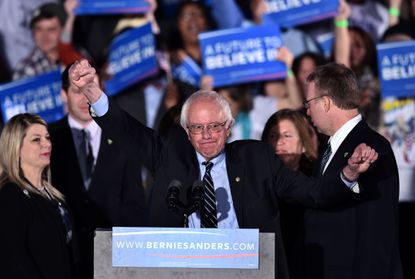Bernie Sanders needs to face the daunting possibility that he might actually be president
Is he really in it to win it?


There's a scene in the third season of The West Wing where the fictional President Josiah Bartlet (Martin Sheen) is working on his re-election kickoff speech and sparring with press secretary C.J. Cregg (Allison Janney). Suddenly he starts reminiscing about his first campaign for president, when he, then the New Hampshire governor, began as a serious underdog to Texas Sen. John Hoynes (Tim Matheson). "I was never supposed to win," Bartlet tells Cregg. "I got in it polling in the single digits. Hoynes had it locked up. I got in it to give some speeches and keep him honest."
If Sen. Bernie Sanders (I-Vt.) wins the Democratic presidential nomination, and then the general election, it's very easy to imagine him saying something similar in 2019.
Indeed, Sanders routinely mentions how he began his own campaign for president facing long odds. He repeated the line on Tuesday night, in his long victory speech after winning the New Hampshire primary by a historically wide margin over one-time prohibitive favorite Hillary Clinton.
Subscribe to The Week
Escape your echo chamber. Get the facts behind the news, plus analysis from multiple perspectives.

Sign up for The Week's Free Newsletters
From our morning news briefing to a weekly Good News Newsletter, get the best of The Week delivered directly to your inbox.
From our morning news briefing to a weekly Good News Newsletter, get the best of The Week delivered directly to your inbox.
"Nine months ago, we began our campaign here in New Hampshire, we had no campaign organization, we had no money, and we were taking on the most powerful political organization in the United States of America," Sanders said. He got into the race with a message about the dangers of money in politics and growing wealth inequality, and he has been repeating it, with demonstrable efficacy, ever since.
After Sanders' close second-place finish in Iowa and sizable victory in New Hampshire, Democrats seem to be gearing up for a hard-fought race for the nomination. Clinton is a slight favorite in Nevada, the next state to vote (on Saturday, Feb. 20), "but it will be closer than people think, and she's not a lock," says Nevada political analyst Jon Ralston. Polling in Nevada, South Carolina, and other future primary and caucus states has been spotty. Clinton is expected to do better in states where the electorate is more moderate and there are more black and Latino voters, but that hasn't been put to the test yet.
If Sanders makes inroads against Clinton's firewall demographics, he might win the nomination. If he wins the Democratic nomination, and Republicans choose a polarizing figure like Donald Trump or Sen. Ted Cruz (Texas), Sanders has a legitimate shot at being elected president. There has been a lot of speculation about whether Trump really wants to be president, but maybe the same question should be asked about Sanders: Is he really in it to win it?
One of Sanders' most appealing qualities is his apparent lack of lust for power. He certainly isn't the only candidate to claim he is running not for his own glory but for his cause, for the people, but he's probably the only one who is believable when he says that. Still, Sanders is also an avowed democratic socialist promising a political and economic "revolution" in a proudly capitalist nation, aiming to be the first Jewish president and the oldest person to hold the office. Nobody would blame him for being surprised, and even a little disconcerted, that he has gotten this far.
Sanders and his campaign, of course, insist that they are gunning for the White House. But at least until recently, says MSNBC's Alex Seitz-Wald, "the world assumed that Sanders was there to influence the political conversation, raise issues important to his movement, and to push presumed nominee Hillary Clinton to the left." He was seen as a candidate like Ron Paul, the 2008 and 2012 Republican presidential candidate who promised a libertarian revolution, probably never expecting to have to lead it from the Oval Office.
Sanders clearly "fits the profile of 'protest candidate' much more than the profile of a serious contender who wants to become president," argues playwright and political scientist Monica Bauer at The Huffington Post. The Vermont senator has shown barely any interest in foreign policy — the area where the president holds most sway — and knows that his main campaign proposals "are completely dead on arrival in Congress," she adds:
Either they've already been rejected many times (single-payer health care) or would be rejected by any Republican-led House of Reps (breaking up the banks, putting special taxes on Wall Street, etc.). So how much fun would it be for a President Sanders to watch while his entire domestic agenda went down in flames? What would he say to all his young, idealistic activist base then? Wouldn't it become a spectacular failure of promises made only to be broken? And who wants to preside over that? [Huffington Post]
Well, maybe Bernie Sanders does. And maybe he'll get his shot to try. As The Week's Ryan Cooper notes, "the tectonic plates of politics are shifting under everyone's feet, and the new alignment hasn't become clear yet." Political scientists and pundits have gotten just about everything about this election wrong so far. If a Sanders win seems somewhere between high comedy and a liberal pipe dream, perhaps that just signals a lack of political imagination.
Whatever the case, Bernie Sanders is now a serious candidate for president of the United States. That doesn't mean that he has to buy a tuxedo, or even comb his hair. But it would be nice if he would explain how any of his campaign promises have a shot at becoming reality, or name some people he would take advice from on foreign policy.
Bernie Sanders might be president. He realizes that, right?
Create an account with the same email registered to your subscription to unlock access.
Sign up for Today's Best Articles in your inbox
A free daily email with the biggest news stories of the day – and the best features from TheWeek.com
Peter has worked as a news and culture writer and editor at The Week since the site's launch in 2008. He covers politics, world affairs, religion and cultural currents. His journalism career began as a copy editor at a financial newswire and has included editorial positions at The New York Times Magazine, Facts on File, and Oregon State University.
-
 Ottawa climate talks: can global plastic problem be solved?
Ottawa climate talks: can global plastic problem be solved?In the spotlight Nations aim to draft world's first treaty on plastic pollution, but resistance from oil- and gas-producing countries could limit scope
By Harriet Marsden, The Week UK Published
-
 Netherlands split on WFH for sex workers
Netherlands split on WFH for sex workersSpeed Read Councils concerned over 'nuisance' of at-home sex work, but others say changes will curb underground sex trade
By Arion McNicoll, The Week UK Published
-
 'He adored Trump, and then rejected him'
'He adored Trump, and then rejected him'Today's Newspapers A roundup of the headlines from the US front pages
By The Week Staff Published
-
 Arizona court reinstates 1864 abortion ban
Arizona court reinstates 1864 abortion banSpeed Read The law makes all abortions illegal in the state except to save the mother's life
By Rafi Schwartz, The Week US Published
-
 Trump, billions richer, is selling Bibles
Trump, billions richer, is selling BiblesSpeed Read The former president is hawking a $60 "God Bless the USA Bible"
By Peter Weber, The Week US Published
-
 The debate about Biden's age and mental fitness
The debate about Biden's age and mental fitnessIn Depth Some critics argue Biden is too old to run again. Does the argument have merit?
By Grayson Quay Published
-
 How would a second Trump presidency affect Britain?
How would a second Trump presidency affect Britain?Today's Big Question Re-election of Republican frontrunner could threaten UK security, warns former head of secret service
By Harriet Marsden, The Week UK Published
-
 'Rwanda plan is less a deterrent and more a bluff'
'Rwanda plan is less a deterrent and more a bluff'Instant Opinion Opinion, comment and editorials of the day
By The Week UK Published
-
 Henry Kissinger dies aged 100: a complicated legacy?
Henry Kissinger dies aged 100: a complicated legacy?Talking Point Top US diplomat and Nobel Peace Prize winner remembered as both foreign policy genius and war criminal
By Harriet Marsden, The Week UK Last updated
-
 Trump’s rhetoric: a shift to 'straight-up Nazi talk'
Trump’s rhetoric: a shift to 'straight-up Nazi talk'Why everyone's talking about Would-be president's sinister language is backed by an incendiary policy agenda, say commentators
By The Week UK Published
-
 More covfefe: is the world ready for a second Donald Trump presidency?
More covfefe: is the world ready for a second Donald Trump presidency?Today's Big Question Republican's re-election would be a 'nightmare' scenario for Europe, Ukraine and the West
By Sorcha Bradley, The Week UK Published